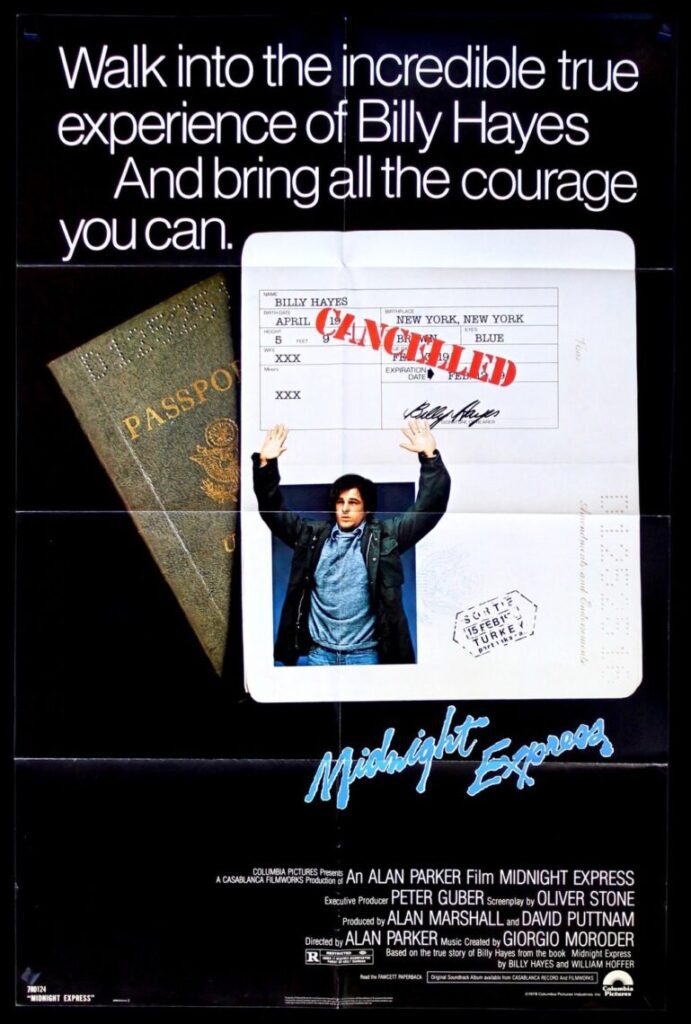
MPAA Rating: R/ Genre: Prison Drama/Stars: Brad Davis, Irene Miracle, Bo Hopkins, Paolo Bonacelli, Paul L. Smith, Randy Quaid, Norbert Weisser, John Hurt, Kevork Malikyan, Yashaw Adem, Mike Kellin, Franco Diogene, Michael Ensign, Gigi Ballista, Peter Jeffrey, Michael Giannatos/Runtime: 121 minutes
A potent and riveting saga that tells of how man can make it through even the most horrific and emotionally sapping ordeals, the slice of cinematic pie that I am reviewing today known as Midnight Express is one that gives us the incredible saga of a young American guy who finds himself behind bars in a visceral prison located in Istanbul and his desperate attempts to survive. Indeed not only one of the finest slices of cinematic pie from the long gone year of 1978, but also the earner of several nods and a couple of victories at the Oscars, this film is a representative of filmmaking that is not really seen that often nowadays anymore sadly. Indeed a movie that permits its narrative to not only speak on its own behalf whilst also staying the core concentration throughout a 2 hour runtime, Midnight Express is aided immensely thanks to a potent and ominous atmosphere, terrific performances, a simplistic yet quite riveting script from no less a talent than Oliver Stone, and a score that is beautiful yet just the right touches of melancholic and haunting rolled into one.
The plot is as follows: Midnight Express tells us the story of a young American man by the name of Billy Hayes as he deliberately decides to walk head on into a nightmare of his own making. A nightmare that consists of being caught mere seconds before getting on a plane out of Istanbul on the night of October 6th in the long gone year of 1970 with quite a bit of hashish found taped to him. As such, we see our poor hero is detained by the authorities whilst his girlfriend who was on vacation with him at the time is allowed to return home to America. To that end, we see that Billy decides to help by showing the proper authorities the guy who he bought the drugs off of in the first place, but attempting to escape whilst doing so really doesn’t do him any favors in that regard. Thus we see that our poor hero (?) ultimately is given a prison sentence of 4 years and a couple of months and sent off to a nightmarish prison where all he has to his name is a dirty bed and pillow. Suffice it to say things don’t exactly go swimmingly for our hero right off the bat as he is beat pretty bad by the guards due to taking a blanket from an open cell in order to stay warm at night. Thankfully as time marches on, we soon see that Billy is able to make the acquaintance of several other foreign inmates like himself by the names of Jimmy, Erich, and Max respectively and from them comes to see that the strongest chance that is in his favor of ever getting to experience life outside the walls of the hellish prison is courtesy of what the prisoners have come to call the “midnight express,” or to put in plain and simple English: finding a way, any way really, to just escape and never look back. Tragedy soon strikes however when, not even 2 months before he is supposed to be released, our hero discovers that he is going to be used as an example and as a result his sentence is lengthened…..by 30 more years. As a result, we now see our main hero try to find a way to board the midnight express and get the heck out of this hell that has come to be his home before life there gets the best of him and he winds up dead.
Now whilst it may be definable by a group of key narrative regaling ingredients that function to support the narrative being told instead of retool it into something that would be easier for an audience to digest, this slice of cinematic pie does not yield from its horrific voyage into the world of the psyche as our main character descends further and further into a world of physical and pathological rot. Indeed as the walls of his hell begin to wrap themselves around him, Billy psychologically seems to get smaller and smaller due to all his internal agony and despair. That and when you pair that up with his friends in the prison being treated just as terribly and his sentence being lengthened, it really isn’t all that surprising to see our main hero practically immerse himself into an internal world defined by hopelessness and insanity. With that in mind, the lead performance given in this movie by Brad Davis is absolutely fantastic. Indeed Davis not only delivers a wide range of emotion in this whilst also showcasing the agony and pain on a physical and psychological level that is a result of how cruel life in prison can be, but he also fully envelops himself in both the part and the pathos of the narrative. A pathos that is perhaps best exemplified during the movie by a moment in which Billy makes an emotional, ice-cold honest, and quite potent appeal before a judge before being given his extra 3 decades in prison. Suffice it to say that Davis manages to give a performance in this that although it might not be one of the more iconic performances in the history of movie magic is still one that is fantastic and so much more.
Operating as an elementary narrative albeit one that is regaled to us with wonderful degrees of passion and rational to say nothing of being constructed courtesy of technical skill that is basic yet quite potent, this slice of cinematic pie is one that triumphs before anything else due to how it is able to draw you into the world of the film not through eye rolling clichés. Instead, this slice of cinematic pie chooses to utilize a delightful simplicity that comes to really describe the narrative, the people in the narrative, and the various tricks of the trade used to bring this narrative to life. This of course starts with the wonderful work done behind the camera by distinct film helmer Alan Parker and his work here is phenomenal. Indeed Parker’s helmsmanship of this film manages to conjure up a spot-on atmosphere that is equal parts ominous, intrigue, and peril which, even though those also come to be key components of the basic construction of the overall movie, are never permitted to override or negate the emotion that is the true heart of this film. Indeed make no mistake dear reader: this movie is one that is more intellectual than visual. As a result the camera is not trying to regale us with the narrative, but rather showcase it whilst also permitting you, the viewer to get the vibe that you are in the prison with Billy and almost feel like you are going through everything that he is. Perhaps one of the finer yet more underrated elements that this movie has going for it would be the score provided to the film by Giorgio Moroder. Indeed not only is it quite the emotional musical accompaniment, but I also feel it does a wonderful job at telling the narrative to us just as well as the script, helmsmanship, and even the performances on display.
Now even though this film is highly regarded from an artistic standpoint, it should also be noted that this movie is also quite controversial due to how it is overly dramatic when it comes to its main protagonist’s time as a guest of the Turkish prison system. Indeed film scribe (and film helmer in his own right) Oliver Stone’s screenplay for this movie is one that has accrued quite a bit of negative feedback for how it manages to quite broadly distinguish the “good guys” from the “bad guys”. At the same time though, it should be noted that it did garner the at times controversial film helmer an Oscar for a take on this story that, flaws aside, was also fairly arresting, bold, simplistic yet also quite emotional as well. Ultimately however when it comes to the work done on this film by Stone I leave you with the following from film helmer Alan Parker in regards not only to the work Stone did on the film, but also how accurate it is from a historical point of view to say nothing of increased artistic licenses I guess you could call them: “Oliver Stone wrote his screenplay and undoubtedly moved further away from the original ‘truth,’ adding his own unique slant to the proceedings.” Be that as it may be, I think it is fairly safe to say that this distinct slice of cinematic pie will always be a movie that many a reviewer will choose to look at through the lenses of both its masterful work, but also in its distinct and controversial touches as well including making every Turkish character an outright antagonist and in how it portrays someone who was, for all intents and purposes, smuggling drugs as someone who is deserving of audiences’ sympathy. Yet when looking at this just from the perspective of artistic merit, I do feel that it should be said that Midnight Express is one of the finest movies from the era of 70s filmmaking and is a riveting ode to phenomenal movie magic to say nothing of a potent and quite emotional saga dealing with the human condition in a way that few other movies before or since have dared to.
All in all brilliantly sculpted and riveting on an emotional level, Midnight Express is a film that quite often thwarts the moral pratfall as showcased in both the movie and in the more controversial ingredients found in its script through no more and no less than genuine movie crafting genius. Indeed by managing to transform a drug smuggler into someone you genuinely come to care about due to how terrible he is treated in a prison that could better be described as Hell on Earth whilst also making a few alterations to a story that actually happened in terms of pathos and creative liberties (though that’s not as uncommon as you might think), the slice of cinematic pie that is Midnight Express is one that most assuredly deserves all the praise that the Oscars gave it even if what it’s about and how it goes about depicting that does make this quite the distinct slice of cinematic pie to behold. Yet I do feel that no matter where you stand in regards to this cinematic take on the saga of Billy Hayes, you cannot deny that the phenomenal work both in front and behind the camera do make this one slice of cinematic pie that is worthy of a watch and perhaps many more after that. On a scale of 1-5 I give Midnight Express “78” a solid 4 out of 5.



